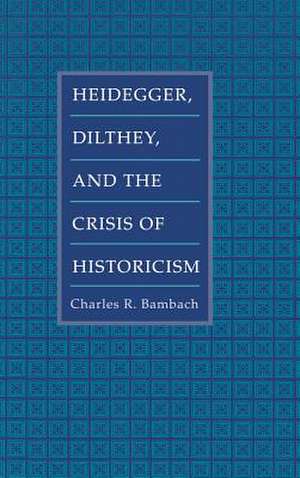Heidegger, Dilthey, and the Crisis of Historicism
Autor Charles R. Bambachen Limba Engleză Hardback – 12 iul 1995
Bambach reconstructs the methodological debates arising from a pervasive sense of crisis among German philosophers in the late nineteenth century. He details the divergent attempts by the Neo-Kantians, Nietzsche, and Dilthey to overcome the limitations of historical relativism. Heidegger's view of historicity, Bambach shows, radically transforms the problematic of historicism into a discourse concerning the crisis of philosophical modernity.
| Toate formatele și edițiile | Preț | Express |
|---|---|---|
| Paperback (1) | 355.59 lei 6-8 săpt. | |
| MB – Cornell University Press – 12 iul 1995 | 355.59 lei 6-8 săpt. | |
| Hardback (1) | 723.48 lei 6-8 săpt. | |
| MB – Cornell University Press – 12 iul 1995 | 723.48 lei 6-8 săpt. |
Preț: 723.48 lei
Preț vechi: 991.06 lei
-27% Nou
Puncte Express: 1085
Preț estimativ în valută:
138.44€ • 148.04$ • 115.43£
138.44€ • 148.04$ • 115.43£
Carte tipărită la comandă
Livrare economică 17 aprilie-01 mai
Preluare comenzi: 021 569.72.76
Specificații
ISBN-13: 9780801430794
ISBN-10: 0801430798
Pagini: 304
Dimensiuni: 152 x 229 x 27 mm
Greutate: 0.63 kg
Editura: MB – Cornell University Press
ISBN-10: 0801430798
Pagini: 304
Dimensiuni: 152 x 229 x 27 mm
Greutate: 0.63 kg
Editura: MB – Cornell University Press
Descriere
Bambach's account of the demise of historicism within the context of German metaphysics provides a new perspective on the development of Heidegger's concept of "historicity" and on the origins of postmodern thought.
